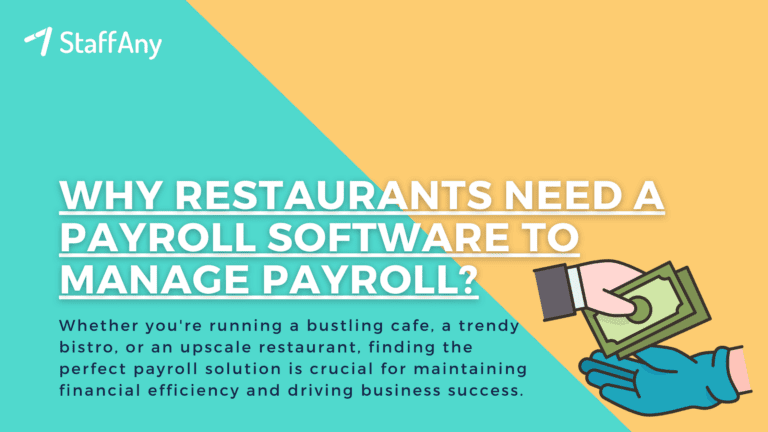In the bustling world of the hospitality industry, the success of any establishment largely hinges upon the efficiency and effectiveness of its food and beverage operations. These operations encompass a wide range of activities, from preparing and serving food and beverages to managing inventory and ensuring customer satisfaction.
In this article, we will delve into the realm of food and beverage operations and explore strategies to optimise them for enhanced success. Let’s get started!
What is Food and Beverage Operations?
Food and Beverage Operations refer to the core activities involved in the preparation, production, and delivery of food and beverages in the hospitality sector. These operations are an integral part of restaurants, hotels, cafés, bars, and any establishment that provides food and drink services to customers.
It includes a multifaceted approach, encompassing culinary expertise, customer service, inventory management, and financial acumen.
Read more: 11 Effective Restaurant Risk Management Strategies
Types of Food and Beverage Operations
Food and Beverage Operations can be categorised into various types based on the nature and scale of the establishment. Let’s explore ten different types of food and beverage operations:
1. Restaurants
Restaurants form the cornerstone of the food and beverage industry, offering a myriad of dining experiences. From cosy family-run eateries serving comfort food to trendy bistros presenting fusion cuisines, restaurants cater to a wide range of tastes and budgets. They provide a space for social gatherings, celebrations, and intimate dinners, making them an integral part of people’s lives.
2. Hotels
In the realm of hotels, food and beverage services play a pivotal role in enhancing guests’ overall experience. From complimentary breakfasts and room service to lavish banquets and themed restaurants, hotels offer a plethora of dining options. The diverse nature of hotel food and beverage operations caters to the preferences of both leisure and business travellers.
3. Cafés
Cafés are cherished for their relaxed ambience, aromatic beverages, and delectable snacks. Whether it’s a quick catch-up with friends or a solo retreat with a book, cafés provide a comforting environment. They often serve as creative hubs for writers, artists, and professionals seeking a tranquil space to work.
4. Bars and Pubs
For those seeking a lively atmosphere and social interaction over drinks, bars and pubs fit the bill perfectly. These establishments offer a wide array of alcoholic beverages, ranging from craft beers to signature cocktails. Beyond libations, they often provide finger foods or appetisers to complement the drinking experience.
5. Fast Food Chains
In the fast-paced modern world, fast food chains cater to customers looking for quick, convenient, and affordable meals. With standardised menus and efficient service, they are a popular choice for families, students, and busy professionals on the go.
Read more: Restaurant Management Plan: Benefits & Development
6. Food Trucks
Food trucks have revolutionised the culinary scene, bringing unique and diverse cuisines to the streets. These mobile kitchens offer a vibrant and dynamic dining experience, often focusing on specific cuisines or creative fusions. Food trucks are an excellent option for foodies seeking delightful surprises around every corner.
7. Catering Services
Catering services cater to the demands of events, parties, weddings, and corporate gatherings. From elegant formal dinners to casual outdoor barbecues, catering operations adapt their menus to suit the occasion and preferences of the clients. The success of any event often hinges on the seamless execution of these services.
8. Fine Dining Establishments
Fine dining operations present a refined culinary experience characterised by exquisite dishes, impeccable service, and elegant surroundings. These establishments often focus on fresh, seasonal ingredients and artistic presentation, making every meal a gastronomic adventure.
9. Buffets and Self-Service Restaurants
Buffets and self-service restaurants offer a diverse selection of dishes, allowing customers to indulge in a wide range of flavours. This style of dining caters to individuals with varying tastes and dietary preferences while providing a sense of autonomy in choosing their meals.
10. Specialty Food Outlets
Speciality food outlets thrive by concentrating on a particular type of cuisine or offering unique dishes that appeal to niche markets. Whether it’s a sushi bar, a vegan eatery, or an artisanal bakery, these outlets appeal to customers seeking specific culinary experiences.
Top 5 Ways to Improve Food and Beverage Operations
Optimising food and beverage operations is crucial for businesses seeking to stay competitive and achieve long-term success. Here are five effective strategies to enhance the efficiency and overall performance of these operations:
1. Streamlining Inventory Management
Effective inventory management is essential for any food and beverage operation. It involves maintaining adequate stock levels, tracking expiration dates, and optimising procurement processes. Implementing modern inventory management software can help streamline the process, reducing waste and ensuring timely availability of ingredients.
2. Embracing Technology
Incorporating technology into food and beverage operations can significantly boost efficiency and customer satisfaction. Implementing point-of-sale (POS) systems can expedite order processing and payment, reducing waiting times for customers.
Additionally, using customer relationship management (CRM) software allows establishments to gather valuable data, enabling personalised service and targeted marketing campaigns.
3. Prioritising Quality and Consistency
Maintaining high-quality standards in food preparation and service is paramount. Consistency in taste, portion sizes, and presentation ensures that customers have a positive and predictable dining experience, encouraging repeat visits and positive reviews.
Read more: The Importance of Workplace Safety in F&B
4. Training and Development
Investing in employee training and development plays a pivotal role in enhancing food and beverage operations. Well-trained staff can deliver superior customer service, handle peak hours efficiently, and adapt to changing customer preferences.
5. Gathering Customer Feedback
Regularly seeking and analysing customer feedback is essential for understanding their preferences and expectations. Implementing feedback forms, conducting surveys, and actively engaging with customers on social media platforms can provide valuable insights for improving food and beverage offerings.
In the ever-evolving landscape of the hospitality industry, food and beverage operations stand as the beating heart of every successful establishment. By understanding the diverse types of operations and implementing effective strategies to optimise them, businesses can thrive in the highly competitive market.
Streamlining inventory management, embracing technology, prioritising quality and consistency, investing in training, and gathering customer feedback are the key pillars of success in this realm.
As the culinary world continues to innovate and enchant, it is crucial for businesses to remain agile and receptive to changing consumer preferences. Adapting to the demands of the modern era ensures that food and beverage operations remain at the forefront of the dining experience, leaving a lasting impression on every guest.
If you’re ready to take your food and beverage operations to new heights, equip your team with the right tools and resources. Discover the power of efficiency with the roster making app like StaffAny, which simplifies employee scheduling, streamlines communication, and optimises workforce management.
Contact us to explore how StaffAny can revolutionise your hospitality business and propel you toward unprecedented success!











